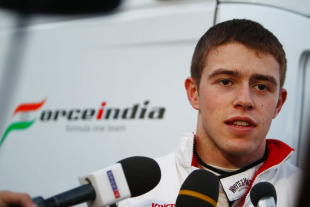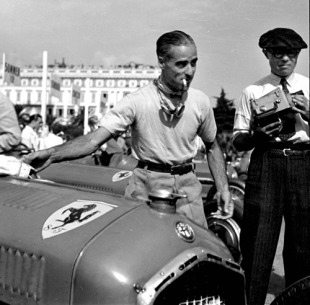
- Drivers:
- Paul di Resta
- |
- Mike Hailwood
- |
- Jacky Ickx
- |
- Jean-Pierre Jarier
- |
- Allan McNish
- |
- Tazio Nuvolari
- |
- Ronnie Peterson
- |
- Clay Regazzoni
- |
- Michael Schumacher
- |
- Ralf Schumacher
Is Paul di Resta the first F1 driver from Scotland since David Coulthard? asked Jim McDonald
Paul di Resta, who scored a point for Force India on his F1 debut in Australia last month, is indeed the first Scottish driver to take part in the world championship since David Coulthard retired at the end of 2008. But the most recent Scot to make his F1 debut before di Resta was Allan McNish - an often under-rated driver, I've always felt - one of the Toyota drivers in their inaugural F1 season of 2002: he didn't score a point, although he had several near-misses. Di Resta is, by my reckoning, the 14th Scot to take part in the F1 world championship, following Coulthard, McNish, Jim Clark, Jim Crawford, Johnny Dumfries, Ron Flockhart, Innes Ireland (generally considered Scottish although he was born in Yorkshire), David Murray, Archie Scott Brown, Ian Stewart, the Stewart brothers Jimmy and Jackie, and Leslie Thorne.
Who holds the record for scoring points in the most successive GPs? asked Max Bright via Facebook
This record, like so many others in F1, is held by Michael Schumacher, who finished in the points in 24 successive races between the 2001 Hungarian GP and the Malaysian one in 2003, a run that obviously included every race of the 2002 season. The sequence ended when he spun off during a downpour in the Brazilian GP, the third race of 2003: it was the only GP that year in which Schumacher didn't score a point.
I remember Mike Hailwood winning the Formula 2 world title in the early 1970s. Did any F2 champion ever go on to win the F1 crown? asked Edward Hamilton
The official Formula Two championship ran from 1967 to 1984 and, although the winners' list is studded with famous names, none of them actually went on to lift the F1 title. A few of them finished as F1 runners-up: Jacky Ickx won the inaugural F2 title in 1967, Clay Regazzoni in 1970 and Ronnie Peterson in 1971, before Hailwood won it in 1972. At this time it was not uncommon for F1 drivers to race in F2 as well, as there were many fewer Grands Prix. Other GP winners who lifted the F2 title were Jean-Pierre Beltoise (1968), Patrick Depailler (1974), Jacques Laffite (1975), Jean-Pierre Jabouille (1976) and Rene Arnoux (1977). The series was revived in 2009, since when the winners have been the Spaniard Andy Soucek and Britain's Dean Stoneman.

I suppose that the most famous drivers of this fascinating period of motor racing history - prior to the establishment of the official F1 drivers' championship in 1950 - were the Italian Tazio Nuvolari and the German Rudolf Caracciola (I apologise in advance to supporters of anyone I've left out, but there's only space for a couple!). Nuvolari started by racing motor bikes, but moved to cars with great success in the 1920s. In 1935 he stunned the Germans by winning at the Nurburgring in an elderly Alfa-Romeo, and was eventually signed up to drive for the German Auto Union team himself: he won the British GP at Donington for them in 1938. Caracciola was an excellent all-round driver who had many successes for Mercedes-Benz and their so-called Silver Arrows: he won the European drivers' championship - the fore-runner of today's world crown - three times in the 1930s. He was especially adept in the rain, becoming the first to earn the affectionate title of "Regenmeister" (master of the rain), which was later passed down to the likes of Jackie Stewart and Michael Schumacher.
Which F1 driver was nicknamed "Jumper"? asked Andy Malone via Facebook
This was the Frenchman Jean-Pierre Jarier, who took part in 143 GPs for a variety of teams between 1971 and 1983 without actually winning one, although he did finish on the podium three times. He was third at Monaco in 1974, driving a Shadow, and third in the South African and British GPs of 1979 in a Tyrrell. His F1 career finished in some controversy when he was accused of blocking the leaders while a back-marker in 1983. I assumed that the nickname "Jumper" was something to do with his overtaking skills - or possibly a tendency to be quick off the mark at the start - but Mr Google suggests it's rather more prosaic than that: apparently the young son of Robin Herd (one of the co-founders of the March racing team) tried to say Jarier's full name and it came out as "Jumper". The name stuck.
Who's the only driver to score more than 300 points in the world championship but never finished higher than fourth in any season? asked Ben Connor
This is the sort of record which is eventually going to be skewed by the new points system, in which many more points than before are awarded. But at the moment the only man who fits your bill is Ralf Schumacher, who collected 329 points in his F1 career, yet never finished higher than fourth in the drivers' championship, which he did in 2001 and 2002. The most points overall without ever winning the title is 654, by Rubens Barrichello - his best positions were second in 2002 and 2004.
If you want to ask Steven a question, use our feedback form. The most interesting questions will be answered here every other Friday. His long-running Ask Steven column on Cricinfo remains one of that site's most popular features
© ESPN Sports Media Ltd.
 If you want to ask Steven a question, use our feedback form. The most interesting questions will be answered here every other Friday. His long-running Ask Steven column on Cricinfo remains one of that site's most popular features Ask Steven features a number of experts, headed by Steven Lynch, who answer your questions across Formula One as well as a variety of other sports
If you want to ask Steven a question, use our feedback form. The most interesting questions will be answered here every other Friday. His long-running Ask Steven column on Cricinfo remains one of that site's most popular features Ask Steven features a number of experts, headed by Steven Lynch, who answer your questions across Formula One as well as a variety of other sports

